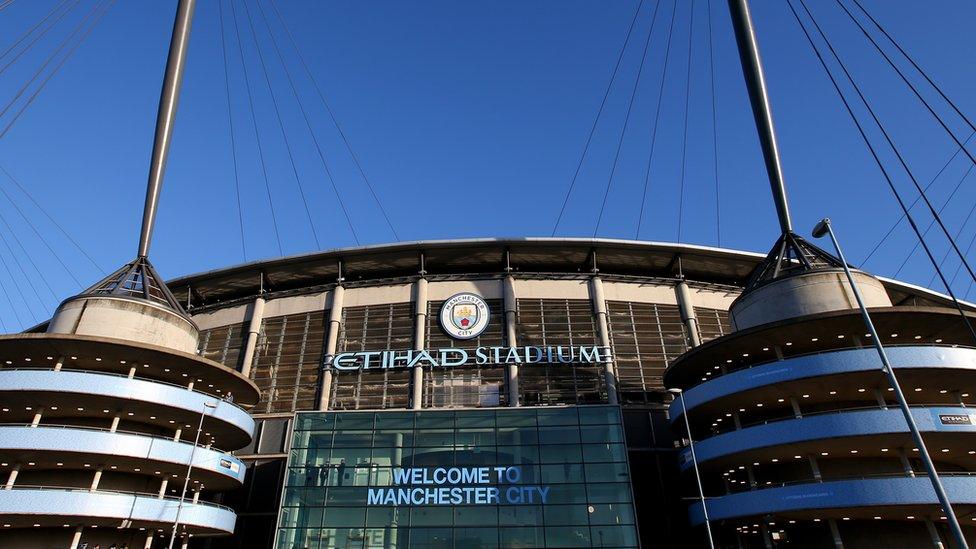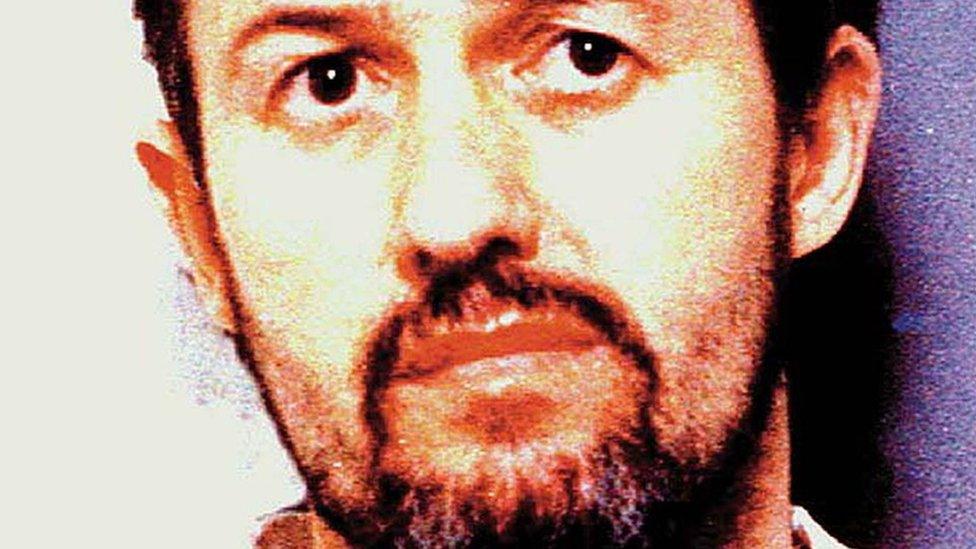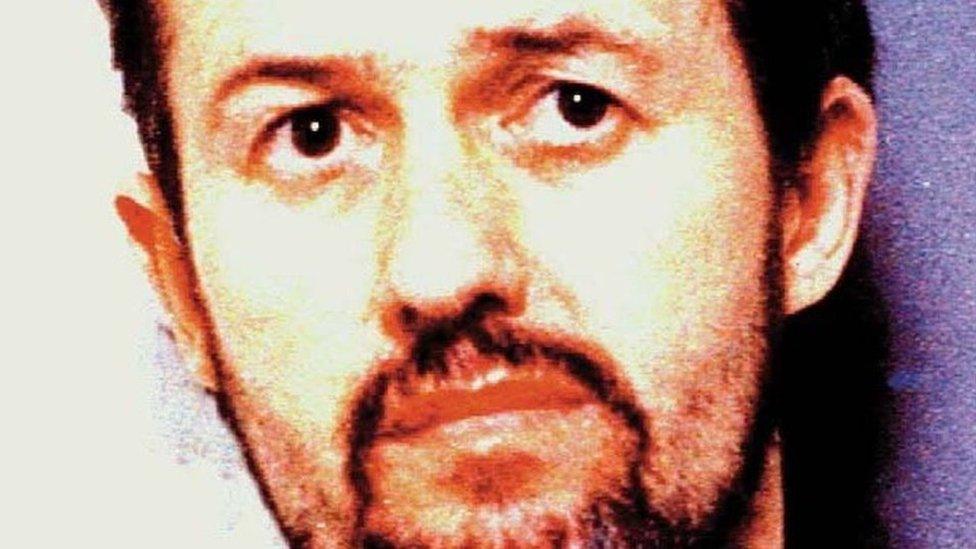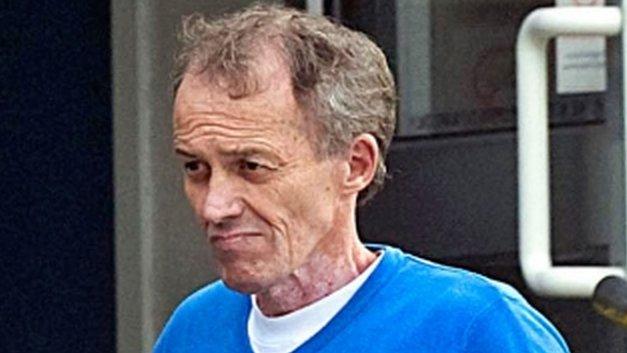After Barry Bennell convictions, where now for football's sexual abuse scandal?
- Published
Andy Woodward says 'justice has been served'
"Justice has been served, but I cannot put into words how I feel about what that man has done."
Outside Liverpool Crown Court, former Crewe Alexandra player Andy Woodward spoke following Barry Bennell's conviction on charges of multiple sex offences against boys.
Thursday's verdict was the conclusion of a movement that began in November 2016, when shocking allegations of widespread historical child sexual abuse in football began to emerge.
Woodward had been the first to speak about the abuse he suffered. Many other victims followed.
Bennell was a former Crewe Alex coach with close associations with Manchester City and Stoke City, as well a number of junior teams in Derbyshire, Staffordshire, Cheshire and Greater Manchester.
So where does the end of his trial leave football?
Man City continue 'exhaustive' review
Bennell had a long association with City and, during the trial, one of his victims said senior figures at the club had known about sexual abuse taking place.
The court was also told by Bennell's defence barrister, Eleanor Laws QC, that the club were being sued by three of his victims, external, who lodged civil cases in March 2016.
In a statement, City said they were continuing a "comprehensive" review, including an investigation into whether and, if so, how the club was "used by Bennell to facilitate alleged sexual abuse of children".
They also said they had established allegations of child sex abuse involving a second person - John Broome - who is dead and not believed to be linked to Bennell. That investigation continues.
City are also "exhaustively" examining a number of reports of "historic anomalous behaviours" of varying levels of gravity and connection to the club over a period spanning more than 50 years.
"Manchester City FC offers its heartfelt sympathy to all victims for the unimaginably traumatic experiences they have endured," the club said.
"No-one can remove their suffering or that of others. All victims were entitled to expect full protection from the kind of harm they endured."
City say they remain keen to speak to survivors or witnesses connected to the club.
FA speak to more than 100 victims and look at 6,000 files
Football child sex abuse scandal one of FA's biggest crises - Greg Clarke
The Football Association's internal review - led by Clive Sheldon QC - is to find out what officials and clubs knew about potential abuse and when, looking at documents from 1970-2005.
It is reviewing 6,000 files flagged as relevant during an initial review of more than 3,000 boxes from the FA's archive. The governing body has also taken the accounts of more than 100 survivors of football-related abuse and received contributions from over 50 other relevant people.
The FA says it has also been in regular contact with clubs conducting their own internal investigations and with the police conducting Operation Hydrant. , external
The governing body has also outlined the next steps for the review, including meeting at least 25 more survivors and approximately 30 other relevant witnesses.
What are the latest Operation Hydrant numbers? | |
|---|---|
839 alleged victims | |
294 alleged suspects | |
2,094 referrals made to the operation | |
334 football clubs 'impacted' (not 334 under investigation) at all levels | |
95% of alleged victims are male | |
Age range for alleged victims is between four and 20 years old | |
Latest figures 31 December 2017 |
Woodward wants Crewe apology
Crewe have been accused of "brushing" the scandal "under the carpet" by the barrister who prosecuted serial paedophile Bennell in 1998. You can read more of that interview here.
The club said a "thorough" police investigation "found no evidence to corroborate that the club was aware of Mr Bennell's offending".
The statement on Thursday added that Crewe "wishes to make it absolutely clear that had it had any suspicion or belief that Mr Bennell was committing acts of abuse, either before, during or after he left the club's employment, the club would have informed the police immediately."
Speaking on Thursday, Woodward said he "would personally like an apology from Crewe for what happened to us boys".
Chris Unsworth, Micky Fallon and Steven Walters outside court
Analysis - 'football's popularity is its weakness'
BBC sports news correspondent Natalie Pirks
When Andy Woodward's 2016 interview hit the headlines, it became clear very quickly that his was not an isolated story. But the sheer scale of people coming forward shocked the world of sport.
In the FA's own words, it forced them to "take a long, hard look in the mirror". It's clear from those I've spoken to - officials, survivors, coaches - that the FA has worked hard to try to ensure abuse like this can never happen again.
But football's popularity is also its biggest weakness. It is almost impossible to monitor every corner of the game. There are more than 7,900 youth clubs in England alone - that's more than 62,000 teams - and all have been checked for safeguarding compliance. But what of the teams that aren't playing in leagues? What of places like holiday camps and after-school coaching?
We know from Operation Hydrant statistics that the majority of survivors have come from an amateur football setting. Ultimately then, the first line of defence lies with parents. Is the coach FA-licensed? Does the team your child has joined, belong to an FA Charter Standard club?
'The amateur game is easiest for predators'
Junior football clubs in England face FA suspensions if their coaches have not been cleared to work with children.
But Ian Ackley, who says he was raped by Bennell more than 100 times from the age of 11 to 14, maintains there is a serious issue at more amateur levels of the game.
"A predatory adult will always look for the easiest settings where they can gain access to children and that's the lower echelons of the game," he said.
Ackley questions how the FA can police amateur football down to playing in parks, which is "not even classed as a regulated activity" until the club "registers and starts playing games in a league".
He also believes some parents still treat football as a "babysitting service" and says they need to take a more responsible role.
"I would ask them - are you prepared to give me your wallet and keys for an hour and a half?" he said. "I can be pretty sure that most wouldn't do that, but they are prepared to leave their child without finding out really how safe they are."
However, Anne Tiivas, director of the NSPCC'S Child Protection in Sport Unit, says elite football still presents a problem.
"As children go up the talent pathway, where they go away from home, the pressure on them to achieve success is just enormous," she said.
"We must be vigilant to that side of sport and that's not just looking at the FA. We must look to the other bodies [Premier League, Football League] and look at what they're doing to put safeguards in place."
What about other professional clubs?
Matt le Tissier given 'very, very wrong' massage by coach accused of sex abuse
Chelsea apologised "profusely" to former footballer Gary Johnson over abuse he suffered in the 1970s. A club review reportedly identified, external 13 more potential victims.
QPR said they were taking allegations made against former employee Chris Gieler "very seriously" and would "co-operate fully" in any investigation.
Ex-Newcastle United player David Eatock reported abuse by a former coach at the club, George Ormond, to police. Last summer, Ormond pleaded not guilty, external to 35 historical sex offences involving 18 alleged victims and he is expected to stand trial in May.
Former Southampton player Matt le Tissier said he had been given a "naked massage" by Bob Higgins, a former coach at the centre of sex abuse allegations. Higgins denies any wrongdoing, while Southampton say they are "fully supporting" Hampshire Police in its investigations.
Charlton Athletic have also opened investigations into allegations of historical abuse.
And the rest of the UK?
Pete Haynes said he hoped victims of abuse would be encouraged to speak out
The Scottish FA launched its own inquiry in February 2017 - with a report expect in late April or early May - and Police Scotland said last November that it was investigating almost 300 crimes.
A former Celtic youth coach, Jim McCafferty, faces eight charges of intentionally touching a boy under the age of 16. McCafferty also worked for other Scottish clubs, including Falkirk and Hibernian, before moving to Northern Ireland about seven years ago.
Hugh Stevenson, a former youth football coach and top-flight assistant referee, has also been accused of a catalogue of child sex offences in Scotland.
Stevenson, who died in 2004, was accused by Pete Haynes of sexually abusing him over a three- to four-year period from 1979.
Partick Thistle said they have also identified a historical allegation of abuse made in 1992 against a former club physiotherapist, who is now dead.
Three of four police forces in Wales are also investigating allegations of historical child sexual abuse at various football clubs.
- Attribution
- Published15 February 2018

- Published15 February 2018

- Attribution
- Published15 February 2018

- Attribution
- Published15 February 2018
